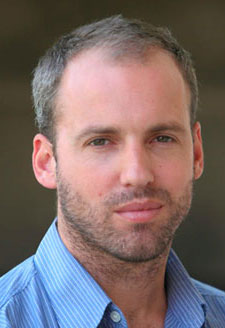Luke Baker’s career has taken him all over the globe to report on everything from film festivals and football tournaments to the conflict in Congo and the Angolan Civil War.
Now Baker has landed in Brussels where he covers finance and politics and serves as bureau chief. He is also a co-author of “Untold Stories from the Frontlines of the Iraq War.”
And though Baker says the methods that make successful journalists tend to be the same, he opened up the habits and techniques that have helped him thrive as an international correspondent.
1) What are your top tips for young business journalists and how can they stay ahead of the game in this competitive field?
When it comes to business and financial journalism it obviously helps to be interested in business and finance for a start. I remember from my college newspaper, The Daily Tar Heel, that the most engaging writers back then were the guys covering sports — because they’d followed it all their lives, knew a lot about it and were passionate. It takes time (and experience) to build up a similar degree of passion for politics, international affairs, finance or business, but when it hits, it needs to be just as intense.
- Know your subject matter inside out and read about it widely – in papers, online, magazines, journals, and books.
- If there’s some particular field you find yourself drawn to, don’t be afraid to specialize but don’t forget the broad view as well.
- Never think someone you meet is too small to care about — the most random people end up becoming serious players.
- Always explore the human side of finance and business — it’s never just about stocks, currencies, bonds or derivatives.
- Don’t be seduced by your subject. You’ll run into lots of wealthy people, but you are still a journalist and your integrity is everything.
2) What is your advice on covering a huge entity, like the European Union, and a phenomenon like the European debt crisis?
When it comes to covering the EU (27 countries, 500 million people, 20-odd languages) or the European debt crisis, scale is everything. It’s such a vast topic/story that it can’t be covered by only one or two people in a single city.
At Reuters, we’ve got bureaus in every EU member state (sometimes more than one) and can call on anywhere up to 30 correspondents to cover a particular story, if needs be. Brussels, where I oversee a team of 25 photo, text and TV journalists, is the central hub of that effort and so my job frequently involves coordinating coverage across a dozen or more countries.
It’s about giving reporters very specific tasks, using our network wisely, pulling all the reporting together rapidly and triangulating the information to produce the hardest-hitting, most-insightful stories we can, under tight time pressure.
In Brussels, you need to have language skills, to be able to build contacts easily with diplomats and policymakers from Germany to Finland to Slovakia and have a good nose for political spin.
3) What are some tips for effectively dealing with spokespeople, especially those who try to avoid specific questions?
The best way of dealing with spokespeople who give pat answers is to go around them. You can’t properly report Brussels/the EU by relying on spokespeople or you’ll never deliver meaningful news. It means building contacts at much higher levels while also keeping the spokespeople on side. To successfully cover a story like the European debt crisis, you need to be on good (up to text-messaging) terms with several of the following:
- Diplomats (up to ambassador-level) from the major countries and as many other states as possible.
- Members of specialist committees working to resolve the crisis, which frequently means finance ministers or their deputies.
- Senior policymakers involved with drafting legislative proposals.
- Top officials in ministries back in the member states’ capitals, not just officials in Brussels.
- Spokespeople, especially those who will engage — and most will, once you’ve built up some trust.
4) Tell us about a time when your persistent, hard work paid off.
Without being too immodest, we’ve broken quite a few big stories during the debt crisis, which has been running for more than two years and shows few signs of letting up. The big moments tend to be summits, when all 27 EU leaders (or sometimes just the 17 from the euro zone countries) get together to hammer out an agreement. The meetings go on for two days and there can be anywhere up to 800 journalists covering them, with all the reporters in one building desperately trying to find out what the leaders upstairs are discussing or have agreed.
Last December, the focus was on Greece and efforts to restructure its debt. We reported that a deal had been reached with bankers to write off half Greece’s debts and we provided figures on the agreement. Lots of diplomats and plenty of journalists in the room came and asked how we’d got it as they were still in the dark. At a news conference at the end of the summit, one senior EU official told a journalist to read the Reuters story if he wanted to know what had been agreed and added: “It’s on Reuters, so it must be true.” That was very satisfying.
5) How do you use social media on the business beat?
Social media is becoming ever more important, although not all aspects of it. I use Twitter all day, every day but don’t use Facebook at all. Twitter I use it as a tip service, as a means of contact-building, to keep up with the conversation even if I’m not taking part in it, and as a way of promoting the bureau’s work. I think you have to exploit social media without getting wrapped up in it, which means using the tools at your disposal but not becoming a slave to them.
LinkedIn is also very valuable if used in the right way – to rapidly reach out to someone who could be a useful contact on a story without having to go through a press or media department at that person’s company. The danger for journalists is trusting these platforms too much.
There’s lots of nonsense/misinformation on Twitter, for example, and you have to make sure your guard is always up. The president of the European Council, which represents EU leaders, sometimes breaks news on Twitter, but even then it’s necessary to double check as his staff (who are responsible for updating his Twitter feed) can make mistakes.










